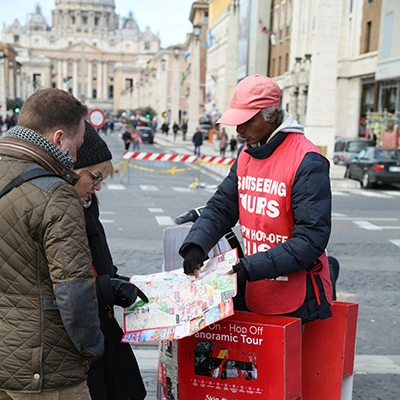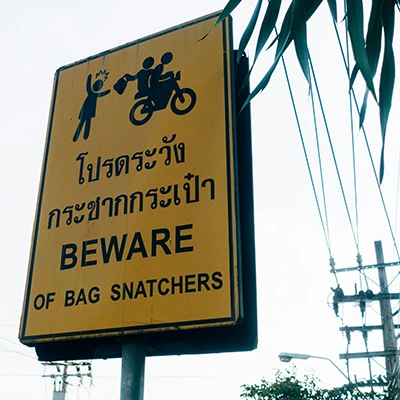Travel scam story time:
I was catching a 4:30 a.m. shuttle to a bus, to another bus, to a plane — standard traveler fare. Also not unusual, the shuttle was late. An Irish woman waited in the pickup spot with me. Her presence made me feel better that I was in the right area.
When 4:45 a.m. rolled around, I took out my ticket from the travel agency and called their listed number. The guy on the other end sounded like he had just woken up.
"Is the shuttle coming?” I asked him. He hesitated a moment and then said, “Yes, yes. Where are you?”
I told him we were at the basketball court of the village, where we had been told to wait. A moment later a man with a collared shirt came up to us. He was a tuk-tuk taxi driver who said he had been dispatched to take us to the shuttle.
We had been told when we purchased our tickets that this might happen. The road to town was horrendous, so sometimes shuttle buses opted to avoid it, sending tuk-tuk taxis to gather the tourists.
Bumping over the potholes in the tuk-tuk, my phone rang. It was the number of the tour company. "Where are you?" the voice asked, "I'm waiting by the basketball court."
Well this was interesting. I asked the driver where we were going. He said to the shuttle, which was in the next village.
"But I'm talking to the shuttle driver on the phone now. He says he's where you picked us up."
Our driver looked confused. Some parts of the story were not adding up. Was this tuk-tuk taxi driver legit, or were me and my newfound Irish companion traveling into a shady situation?
I had the taxi driver talk directly to the guy on the phone who said he was from the tour agency. He kept calling, asking where we were. The driver started to seem uncomfortable about the situation.
Then the situation seemed to resolve itself. We pulled up to a mini-bus filled with other travelers. The tour company number called again. "The bus is waiting," he said. But we were now on the bus. Or were we? I had him talk to the bus driver, but the other guy hung up when questions into his legitimacy were posed.
The bus driver gave me a grave look, "That was some thief," he said. "What are you doing listening to him?"
"Well," I said, "That's the number of your tour company according to the ticket."
What Happened to Luke?
This is a potentially very scary situation, but not an uncommon one, even for an experienced traveler like Luke Armstrong, who shared this tourist scam nightmare.
It nearly happened to Seven Corners writer Becky Hart, too. She’d scheduled an Uber and when she asked, “Are you Bernardo?” he said yes. She quickly found out, though, that he was not, in fact, Bernardo.
Yes, he was an Uber driver, but he wasn’t her Uber driver. It turned out to be a simple miscommunication rather than a scam — neither of them was speaking their first language in this interaction — but still potentially a bad situation.
Here’s Luke again to explain what happened:
“In the country where this took place, cell phone theft is common. The tour company's phone had been stolen, so I was speaking to the thief of that phone, not a representative of the tour company,” he said. “The thief must have been thinking he'd hit the jackpot. Now potential victims were calling him at 4:30 a.m., telling him where to meet them! To a thief, this must have felt like Christmas.”
The question is, if you were Luke, what would you do?
How to Avoid Scams on Vacation
1. Look for inconsistencies between the situation and the story you’re getting.

It's hard sometimes in a new culture and country to always understand what's going on. Something that doesn't make sense seems to always be happening! You don't have to be paranoid about every strange situation, but do note when something doesn't make sense and ask the question, "Is something not right here?"
2. Pay attention to your instincts.
Deep down, we know. Humans have this amazing sixth sense. Some people are more in tune with that gut feeling than others, but this is a skill that can be cultivated.
Give yourself time to pause and reflect during important situations. Don't just go with the flow. Ask articulate questions, "What's really going on here? What is my gut dictating that I do?"
3. Choose reputable companies.
There are employees in offices selling tours and then there are people on the street offering those tours for less. As a general rule, most guys on the street selling tours are legit. But most illegitimate deals are sold by guys on the street.
The "better safe than sorry" attitude encourages going with the brick-and-mortar tour outfits, even if it costs a bit more. Your safety is worth it.
Similarly, only buy tickets and services direct. It’s true that you can sometimes find a better deal going through a third party, and this isn’t always a scam, but it can sometimes create more headaches than it’s worth.
The third-party travel supplier has less incentive to help you get your money back if you need to cancel or change your mind, and they’re less motivated to provide excellent customer service after they’ve made the sale. Going directly to the source is sometimes the only way to go.
4. Know the common scams of your destination.

Arm yourself with knowledge so you know what to be on the lookout for. Know how scammers ask for money and the types of tricks they might try to play. Preparedness can go a long way.
5. Set the price first.
Before getting into any taxi or going on any tour, always agree on the price beforehand. Taxi drivers can run meters or take you on a runaround of a foreign city to jack up prices. Setting your price before getting into a taxi or a tour helps you reduce confusion and hopefully lets you stay more in control of the situation.
6. Don’t be afraid to walk away.
Scammers are great at playing with your emotions and making you feel obligated to go along with them. They know if they can get you halfway convinced with whatever scam they’re peddling, their pressure will get you the rest of the way.
Try not to get hooked. Even if you "agreed" to something, you're allowed to change your mind. A polite but firm “no, thank you” should be enough to get you out of the situation.
7. Be realistic.
If a price or deal seems too good to be true, it probably is. If someone offers to take your photo or give you a gift, be wary of taking it.
Many times, once you accept this “gift,” you are asked for money and put in a precarious position. Again, a simple “no, thank you” can be your best friend.
8. Be cautious of claims that a site is closed.
Many scammers pray on unsuspecting tourists by pretending to help. A common scheme is claiming that a site you want to visit is closed. They then offer to take you somewhere else.
If a major attraction is closed, which doesn’t happen often and rarely without warning, you’ll know. Don’t rely on a stranger who is looking to give you the runaround and get a kickback from it. Instead, kindly refuse and walk away.
9. Protect yourself against pickpocketing.

One of the main ways travelers get pickpocketed is through distraction. One person will come up to you perhaps performing something, offering you a gift, or asking if you need help while their accomplice slyly snatches your goods out of your pocket.
Your best bet is to keep valuables out of pockets and in a protected over-the-neck pouch, in a shoe, or in a hidden zip pocket. If you carry your belongings in a bag, choose a pack with a thick strap that’s harder to break or cut through, and carry it in front of you where you can keep an eye on it.
10. Exude confidence.
Looking lost and confused can make you seem like an easy target for a travel scam. Stand tall, try to appear relaxed and confident, and give off the vibe that you are not one to be easily fooled. Even if you don’t truly feel that way, fake it ‘til you make it.
Protection with Travel Insurance
Travel is meant to be fun and exhilarating, not stressful and scary. These tips can help you feel more secure in a new place, but they are admittedly no guarantee to avoiding scams completely.
For added protection when the unsavory does happen, consider travel insurance. The right coverage can provide reimbursement for replacing stolen items. And the right company will also provide travel assistance services, which can help you navigate any number of sticky situations.
Contact a Seven Corners licensed agent to help find the best travel insurance for you or get a quick quote online before your next trip.
